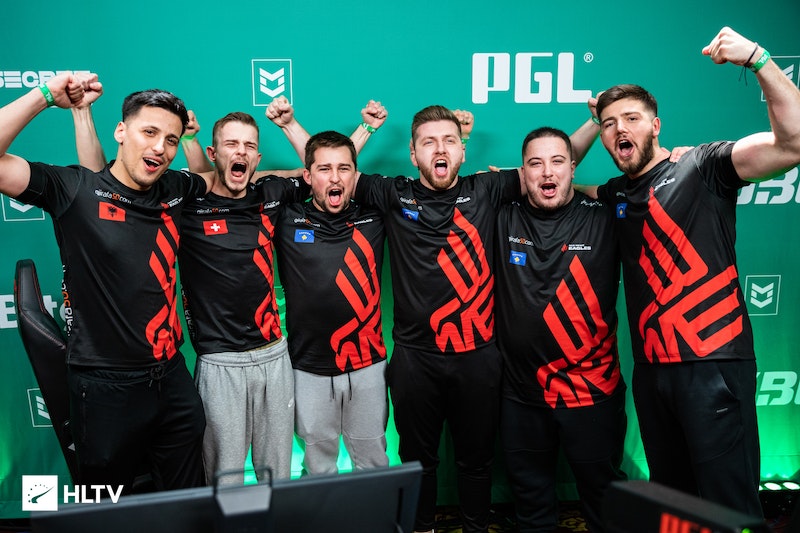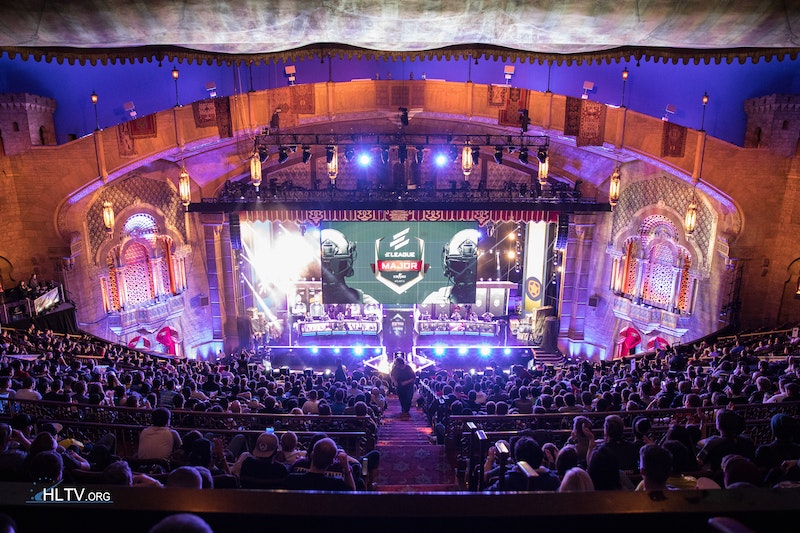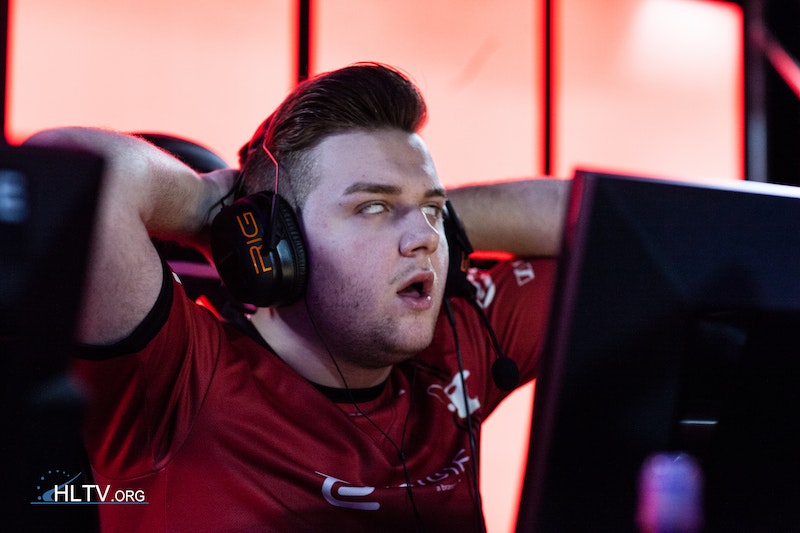Counter-Strike prides itself on its open circuit. Compared to the franchise leagues of League of Legends and, soon, VALORANT, we are proud of the fact that teams like Cloud9 (under Gambit Youngsters and later Gambit), Movistar Riders, Bad News Eagles, Spirit and Copenhagen Flames can undergo long journeys from tier two to the Major. Success is earnt, not bought.
Admittedly, this is only true these days of the Valve Majors. BLAST and ESL, the two biggest operators, run semi-closed circuits with partner teams, leaving fewer spots for the open qualifiers — but there are still spots. ESL Pro League is part of a ladder all the way down to ESEA Open and the system still allows, however difficult, for you to grab four friends and make it to the top. BLAST has qualifiers upon qualifiers for teams around the world, and Gambit won BLAST Premier Spring Final 2021 as a non-partnered team coming from the final qualifier, the Showdown.
Movistar Riders are the latest team to underperform and fall in open qualifiers
Online open qualifiers are a necessary part of this ideological stance. It is simply not feasible for 256+ team single-elimination tournaments to be run on LAN or with best-of-threes, which presents a problem: Teams have to qualify for a LAN tournament online, in what is functionally a very different video game. It is a more extreme version of a Premier League football team having to play on a muddy, slow pitch in the FA Cup in a village in the middle of nowhere.
This, naturally, causes upsets. Movistar Riders is only the latest top team to be taught a lesson by the cruel world of open qualifiers — just ask Apeks, TITANS, and Eternal Fire how easy Counter-Strike is without partner slots. Other teams, like the top five side Astralis, scraped through the grueling RMR open qualifier brackets by the skin of their teeth after several eight-hour marathon days.
Having upsets is not necessarily a problem in and of itself, but this is a good time to take a step back: What is the point of a qualifier for a tournament? Objectively, the answer is to whittle down a large group of squads to be left with only the best teams at the end. Single-elimination open qualifiers, plainly, do not achieve this goal. For every Bad News Eagles there are multiple teams that go out in last place after the open qualifiers never to be seen again.

Bad News Eagles’ run at PGL Major Antwerp was a perfect example of the open circuit working
That is why there are four open qualifiers; tournament organisers are giving the big, LAN-proven teams as many chances as possible to get lucky and avoid an upset. But there might be a solution right under our noses. In fact, it’s already used in the Major cycle, only later on: Chess’ Swiss-system tournament format.
Round-robin is obviously ill-suited for 512-team tournaments, as is GSL, for taking too long. Best-of-one single-elimination whittles down the number of teams quickly, but is so punishing that the chances of the best teams qualifying is lower than it would be in an optimal setting. Swiss offers a middle-ground of the two, featuring the same or less matches as a single-elimination bracket while there is a higher bar for elimination than a single best-of-one against a team you have never played before.
The system we use for the Majors is actually a heavily modified version of what Julius Müller thought up for a chess tournament in Switzerland in 1895. In fact, it is unheard of for Swiss tournaments in chess to feature elimination until the very end of play. While the presence of elimination games is convenient for LAN tournaments like the RMR and Major for both entertainment and logistical reasons, there is no need to introduce the same principle in online open qualifiers.

The Swiss system was first used for the Major group stage at ELEAGUE Atlanta 2017
The lack of elimination in chess tournaments doesn’t necessarily carry with it the removal of incentive for people to try because ELO is so important, but there is still a solution: The Gibson Rule, whereby players who are mathematically secured of qualification or elimination are excused from future rounds. Swiss will also solve the issue of teams giving up after the first few games; rather than byes for the team whose opposition forfeited, Swiss tournaments can adjust for odd numbers fairly easily by re-jigging the pairings.
For a bracket of 512 teams, which is about standard for these open qualifiers, nine rounds of Swiss would be needed, though many teams would play less due to the Gibson Rule. If we still wanted to have four open qualifiers — and arguably, we would not need as many as four since Swiss is so much fairer — split over two days each, only the teams with the best four records would be given an RMR spot. This brings us to the major flaw of Swiss: A tiebreaker, either Buccholz or play-off matches, would often be the thing to decide which team got the RMR spot.
In an ideal world, we could even only play one game per day in one big Swiss system, and make it best-of-threes to boot
There is also the fact that in Swiss, round one has to completely finish before the pairing can be done for round two. So, in theory, 510 teams could be waiting for a single quadruple-overtime match to finish. You can imagine how Twitter would light up in that scenario.

Games like mousesports’ 31-28 win over FlipSid3 at MLG Columbus would delay the entire field in Swiss
The same flaws are present in chess, though draws help prevent tiebreakers by giving players a chance to salvage 0.5 points out of a game. It comes down to opinion, but the benefits of Swiss seem to outweigh teams having to wait half an hour to play their next game. There are also solutions, such as scheduling around the possibility of a long game by having fewer games per day. In an ideal world, we could even only play one game per day in one big Swiss system, and make it best-of-threes to boot.
Nine days of play (only one more than the current system) spread over two weeks, with one best-of-three for each team per day. The sixteen highest-ranked teams at the end of action would then qualify for the RMR. Not only does this reduce randomness by letting teams anti-strat, it would be less exhausting for players than back-to-back eight-hour days — how can we expect teams to be at their best in such a scenario?
Swiss does not punish underdogs, if anything it rewards teams by re-iterating that their run against multiple more well-known opponents was legitimate
There is an argument that open qualifiers should be grueling and unforgiving, this is the Major we’re talking about — Movistar Riders, Apeks and stable teams around the top 30 should on paper be able to get through at least one of these four open qualifiers ahead of mix-teams put together in the last minute, even if it’s in a long day of online best-of-ones. Yet they don’t.

We have seen so many open qualifiers over the years, and teams that we know should breeze through on name value alone stumble again and again. In Swiss, teams play other teams on the same record, so we can tell if an upset is repeatable. Swiss does not punish underdogs, if anything it rewards teams by re-iterating that their run against multiple more well-known opponents was legitimate.
The key point here is that the more efficient the qualifier, the better the tournament. Open qualifiers still need to exist to give new teams a chance to rise, but the RMRs and the Majors are supposed to be fought between the very best teams in Counter-Strike — the Swiss system would ensure every team to qualify unreservedly deserved to do so. Thus, we would get more competitive and entertaining games at the RMR and the Major, which is the only objective that matters for an open qualifier.
Chess has been holding open tournaments for hundreds of people for more than a century, and Swiss is the system they have settled for. Maybe, just maybe, there is a reason for that.
- alpha metaverse
- battlebots
- blockchain
- blockchain conference esports
- coingenius
- crypto conference esports
- esport games
- esporta
- esporta app
- esporta fitness
- esports
- evil geniuses
- games with esports
- globo esporte
- HLTV
- loco esports games
- metaverse esport games
- national sports week
- plato
- plato ai
- Plato Data Intelligence
- Plato Game
- PlatoData
- platogaming
- simplicity esports
- spasm esports games
- steam esports games
- team solomid
- top esports games
- tundra esports
- twitch esports games
- zephyrnet













